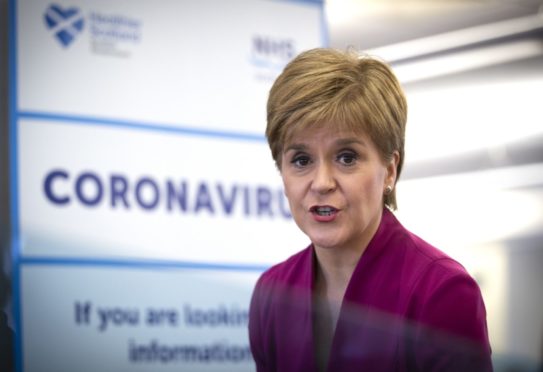Nicola Sturgeon says nobody in Scotland should be forced into making decisions on “do not resuscitate” forms as a result of the coronavirus pandemic.
The First Minister was responding after a family hit out when they learned their 86-year-old grandmother agreed to a DNACPR (Do Not Attempt Cardiopulmonary Resuscitation) request from her GP surgery.
Helen Wray told The Courier her mother was sent the form – which identifies a patient who does not wish to have CPR performed on them should their cardiac or respiratory functions cease – after receiving a phone call from a locum doctor at the Ryehill Medical Practice in Dundee.
She said her mother, who the family asked to keep anonymous, was “happy to take a phone call from anyone”, but would rarely remember the discussion.
The DNACPR order had a hand-written note on it that reads “telephone consultation as per Covid-19 protocol.”
Government body Health Improvement Scotland is said to be have been sharing updated guidance on anticipatory care conversations during the Covid-19 outbreak.
However, asked about the issue at her daily coronavirus briefing at St Andrew’s House in Edinburgh on Friday, Ms Sturgeon said: “Nobody, not just in these circumstances but in any circumstances, should be pushed into anything like that.”
And Scotland’s Chief Medical Officer, Dr Catherine Calderwood, added there is “absolutely not” new guidance pushing patients towards signing “do not resuscitate” forms in light of the pandemic.
She said: “There is certainly not any protocol nationally or otherwise for pushing people into a ‘do not resuscitate’ signature.
“We have had a lot of conversations – in fact, started by members of the public but taken on board by colleagues in primary care and in the hospitals – about people making their own wishes known were they to become significantly unwell.
“This is not something that is directly related to Covid-19.”
She said discussions around DNACPR decisions amongst families “at any time” is something that is “welcomed”.
Dr Calderwood added: “Because some members of the public say, having discussed it, they realise their relatives have their wishes all laid out for people to hear.
“Of course if people are wanting everything done, that is absolutely the right thing.
“Those shared decision-making conversations are happening and have been happening for many, many years across Scotland.”
She added: “These discussions perhaps are becoming more pertinent if people are going to become significantly unwell, but this is absolutely not something that we are discussing in the light of Covid-19, and pushing people into decisions that they would otherwise not be comfortable with.”
Death toll rises by 46
Ms Sturgeon also warned the coronavirus peak is still some time away as she announced the number of deaths in Scotland has risen to 172.
The Covid-19 death toll is an increase of 46 on the previous day, while 3,001 people have now tested positive for the virus in Scotland – up from 2,602 on Thursday.
There are 176 people are in intensive care with the disease or expected to have it, a rise of 14.
The First Minister said: “I want to be very clear that nothing I have seen gives me any basis whatsoever for predicting the virus will peak as early as a week’s time here in Scotland.”
The Scottish Government is looking at how antibody testing – which can tell if a person has previously had the virus – can move Scotland out of lockdown, although the test does not currently exist in a “reliable form”, Ms Sturgeon added.
